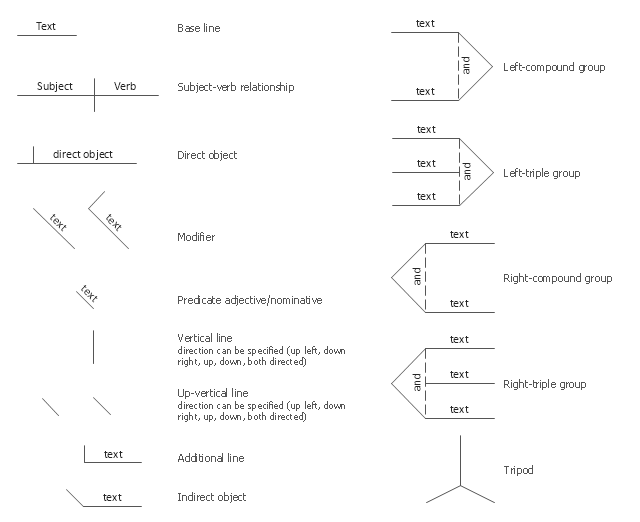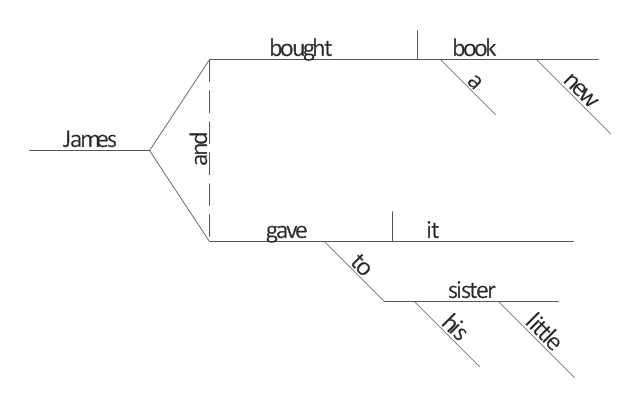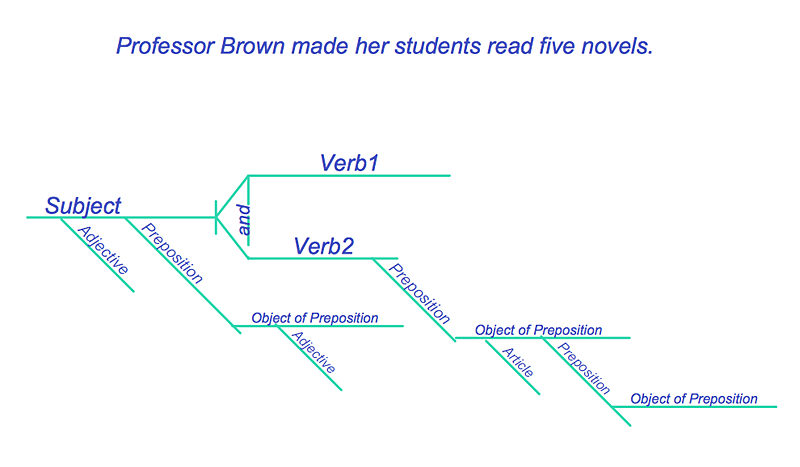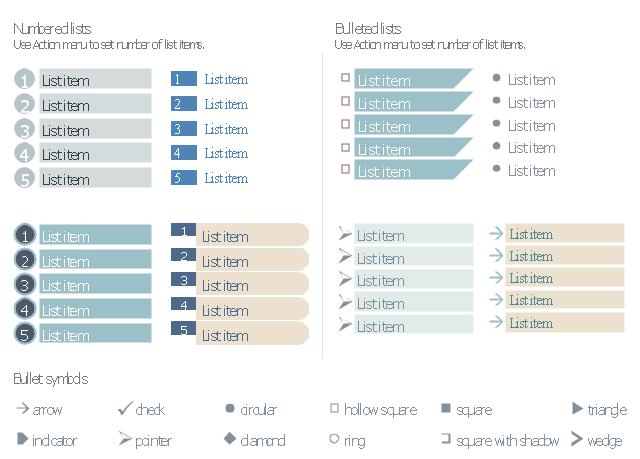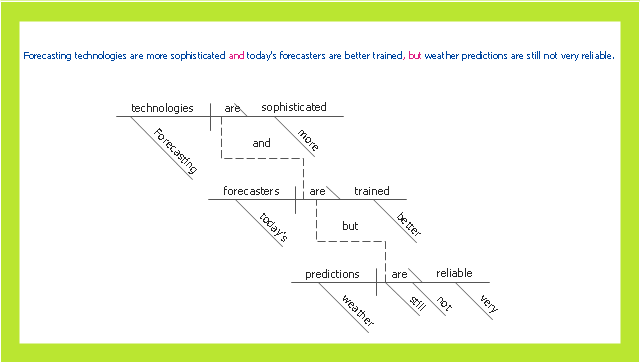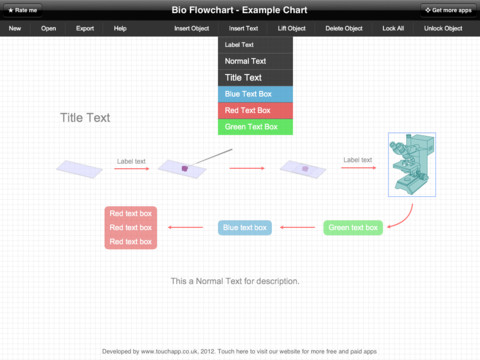The vector stencils library "Sentence diagrams" contains 18 shapes for drawing sentence diagrams or parse trees.
"In pedagogy and theoretical syntax, a sentence diagram or parse tree is a pictorial representation of the grammatical structure of a sentence. The term "sentence diagram" is used more in pedagogy, where sentences are diagrammed. The term "parse tree" is used in linguistics (especially computational linguistics), where sentences are parsed. The purpose of sentence diagrams and parse trees is to have a model of the structure of sentences. The model is informative about the relations between words and the nature of syntactic structure and is thus used as a tool to help predict which sentences are and are not possible." [Sentence diagram. Wikipedia]
The shapes example "Design elements - Sentence diagrams" was created using the ConceptDraw PRO diagramming and vector drawing software extended with the Language Learning solution from the Science and Education area of ConceptDraw Solution Park.
"In pedagogy and theoretical syntax, a sentence diagram or parse tree is a pictorial representation of the grammatical structure of a sentence. The term "sentence diagram" is used more in pedagogy, where sentences are diagrammed. The term "parse tree" is used in linguistics (especially computational linguistics), where sentences are parsed. The purpose of sentence diagrams and parse trees is to have a model of the structure of sentences. The model is informative about the relations between words and the nature of syntactic structure and is thus used as a tool to help predict which sentences are and are not possible." [Sentence diagram. Wikipedia]
The shapes example "Design elements - Sentence diagrams" was created using the ConceptDraw PRO diagramming and vector drawing software extended with the Language Learning solution from the Science and Education area of ConceptDraw Solution Park.
A Sentence Diagram is a pictorial representation of the grammatical structure of a natural-language sentence.
Diagramming sentences is a way to visualize how the different parts of a sentence fit together: the subject of a clause goes in one slot, the verb in another, and so on. Words that modify another word are attached to the word they modify. Understanding the functions of parts of the speech in a sentence and their relationship to one another can be very helpful in learning to construct good sentences.
The diagram of a sentence begins with a horizontal line called the base. The subject is written on the left, the predicate on the right, separated by a vertical bar which extends through the base. The predicate must contain a verb, and the verb either requires other sentence elements to complete the predicate, permits them to do so, or precludes them from doing so. The verb and its object, when present, are separated by a line that ends at the baseline.
For example, let's consider the following sentence: James bought a new book and gave it to his little sister. So, we see such parts of a sentence:
- James is the subject;
- bought a book and gave it are the compound predicate with direct objects (book, it);
- his sister is the indirect object;
- new, little are adjectives.
[Sentence diagram. Wikipedia]
This sentence diagram template for the ConceptDraw PRO diagramming and vector drawing software is included in the Language Learning solution from the Science and Education area of ConceptDraw Solution Park.
Diagramming sentences is a way to visualize how the different parts of a sentence fit together: the subject of a clause goes in one slot, the verb in another, and so on. Words that modify another word are attached to the word they modify. Understanding the functions of parts of the speech in a sentence and their relationship to one another can be very helpful in learning to construct good sentences.
The diagram of a sentence begins with a horizontal line called the base. The subject is written on the left, the predicate on the right, separated by a vertical bar which extends through the base. The predicate must contain a verb, and the verb either requires other sentence elements to complete the predicate, permits them to do so, or precludes them from doing so. The verb and its object, when present, are separated by a line that ends at the baseline.
For example, let's consider the following sentence: James bought a new book and gave it to his little sister. So, we see such parts of a sentence:
- James is the subject;
- bought a book and gave it are the compound predicate with direct objects (book, it);
- his sister is the indirect object;
- new, little are adjectives.
[Sentence diagram. Wikipedia]
This sentence diagram template for the ConceptDraw PRO diagramming and vector drawing software is included in the Language Learning solution from the Science and Education area of ConceptDraw Solution Park.
HelpDesk
How to Diagram Sentences in ConceptDraw PRO
Diagramming sentences is a playful, fun way to learning English Grammer. Sentences can be very complex, and can contain many different parts of speech which implicate many different grammatical rules. Diagramming sentences will help you to make sure every parts of your sentence are grammatically correct, and provides you with more comprehensive understanding of the English Language. A Sentence Diagram displays the parts of a sentence as a diagram in order to show the relationship of words and groups of words within the sentence. Sentence Diagram shows the relationship between the proposal of its parts. This is a good way to teach grammar! Sentence Diagram helps to make the writing more coherent as well as more interesting to read. ConceptDraw PRO allows you to create clear sentence diagrams using the special templates and vector stencils library.The vector stencils library "Management list blocks" contains 20 list block shapes: numbered list, bulleted list, bullets.
Use these list elements to design your management infograms.
"In typography, a bullet is a typographical symbol or glyph used to introduce items in a list. ...
The bullet symbol may take any of a variety of shapes, such as circular, square, diamond, arrow, etc. ...
Bullets are most often used in technical writing, reference works, notes and presentations. ...
Bulleted items – known as "bullet points" – may be short phrases, single sentences, or of paragraph length. Bulleted items are not usually terminated with a full stop if they are not complete sentences, although it is not rare to terminate every item except the last one with a semicolon, and terminate the last item with a full stop. It is correct to terminate a bullet point with a full stop if the text within that item consists of one 'full' sentence or more." [Bullet (typography). Wikipedia]
The shapes example "Design elements - Management list blocks" was created using the ConceptDraw PRO diagramming and vector drawing software extended with the Management Infographics solition from the area "Business Infographics" in ConceptDraw Solution Park.
Use these list elements to design your management infograms.
"In typography, a bullet is a typographical symbol or glyph used to introduce items in a list. ...
The bullet symbol may take any of a variety of shapes, such as circular, square, diamond, arrow, etc. ...
Bullets are most often used in technical writing, reference works, notes and presentations. ...
Bulleted items – known as "bullet points" – may be short phrases, single sentences, or of paragraph length. Bulleted items are not usually terminated with a full stop if they are not complete sentences, although it is not rare to terminate every item except the last one with a semicolon, and terminate the last item with a full stop. It is correct to terminate a bullet point with a full stop if the text within that item consists of one 'full' sentence or more." [Bullet (typography). Wikipedia]
The shapes example "Design elements - Management list blocks" was created using the ConceptDraw PRO diagramming and vector drawing software extended with the Management Infographics solition from the area "Business Infographics" in ConceptDraw Solution Park.
 Education
Education
This solution extends ConceptDraw PRO and ConceptDraw MINDMAP with specific content that helps illustrate educational documents, presentations, and websites quickly and easily with astronomy, chemistry, math and physics vector pictures and clip art.
 Language Learning
Language Learning
Language Learning solution extends ConceptDraw PRO software with templates, samples and library of vector stencils for drawing the sentence diagrams.
This sentence diagram sample was createb on the base of the webpage "Diagramming Sentences" from the website of the Capital Community College, Hartford CT. [grammar.ccc.commnet.edu/ grammar/ diagrams2/ one_ pager2.htm]
"In grammar, clause structure refers to the classification of sentences based on the number and kind of clauses in their syntactic structure. Such division is an element of traditional grammar.
A simple sentence consists of only one clause. A compound sentence consists of two or more independent clauses. A complex sentence has at least one independent clause plus at least one dependent clause.
A sentence consisting of one or more dependent clauses plus two or more independent clauses may be called a complex-compound sentence or compound-complex sentence. ...
A compound sentence is composed of at least two independent clauses. It does not require a dependent clause. The clauses are joined by a coordinating conjunction (with or without a comma), a semicolon that functions as a conjunction, a colon instead of a semicolon between two sentences when the second sentence explains or illustrates the first sentence and no coordinating conjunction is being used to connect the sentences, or a conjunctive adverb preceded by a semicolon. A conjunction can be used to make a compound sentence. Conjunctions are words such as for, and, nor, but, or, yet, so (the first letters of which spell "fanboys"). The use of a comma to separate two independent clauses without the addition of an appropriate conjunction is called a comma splice and is generally considered an error (when used in the English language)." [Sentence clause structure. Wikipedia]
The example "Compound sentence" was created using the ConceptDraw PRO diagramming and vector drawing software extended with the Language Learning solution from the Science and Education area of ConceptDraw Solution Park.
"In grammar, clause structure refers to the classification of sentences based on the number and kind of clauses in their syntactic structure. Such division is an element of traditional grammar.
A simple sentence consists of only one clause. A compound sentence consists of two or more independent clauses. A complex sentence has at least one independent clause plus at least one dependent clause.
A sentence consisting of one or more dependent clauses plus two or more independent clauses may be called a complex-compound sentence or compound-complex sentence. ...
A compound sentence is composed of at least two independent clauses. It does not require a dependent clause. The clauses are joined by a coordinating conjunction (with or without a comma), a semicolon that functions as a conjunction, a colon instead of a semicolon between two sentences when the second sentence explains or illustrates the first sentence and no coordinating conjunction is being used to connect the sentences, or a conjunctive adverb preceded by a semicolon. A conjunction can be used to make a compound sentence. Conjunctions are words such as for, and, nor, but, or, yet, so (the first letters of which spell "fanboys"). The use of a comma to separate two independent clauses without the addition of an appropriate conjunction is called a comma splice and is generally considered an error (when used in the English language)." [Sentence clause structure. Wikipedia]
The example "Compound sentence" was created using the ConceptDraw PRO diagramming and vector drawing software extended with the Language Learning solution from the Science and Education area of ConceptDraw Solution Park.
Bio Flowchart
This app targets to help teachers and students to create vivid and professional biological flowcharts and diagrams in an easy way.- Design elements - Sentence diagrams | How to Diagram Sentences ...
- Sentence Diagram | Free Sentence Diagrammer | Design elements ...
- Free Sentence Diagrammer | Sentence Diagram | Sentence diagram ...
- Sentence Diagram | Design elements - Sentence diagrams | Free ...
- Compound sentence | How to Diagram Sentences in ConceptDraw ...
- Sentence diagram - Compound predicate with one direct object ...
- Compound Sentence Diagram
- Language Learning | Sentence diagram - Template | Examples of ...
- Sentence Diagram | Venn Diagram Maker | Design elements ...
- Language Learning | Sentence diagram - Template | The Reed ...
- Compound sentence | How to Diagram Sentences in ConceptDraw ...
- Sentence diagram - Template | UML Class Diagram Generalization ...
- Electrical Symbols, Electrical Diagram Symbols | Electrical Drawing ...
- UML sequence diagram - GET request | Sentence diagram ...
- Sentence Diagramming Indirect Object
- Sentence diagram - Template | Blank Compound Sentence Diagram
- How to Diagram Sentences in ConceptDraw PRO | How To Make ...
- Free Sentence Diagrammer | Sentence Diagram | Design elements ...
- Sentence Diagram | How to Diagram Sentences in ConceptDraw ...
